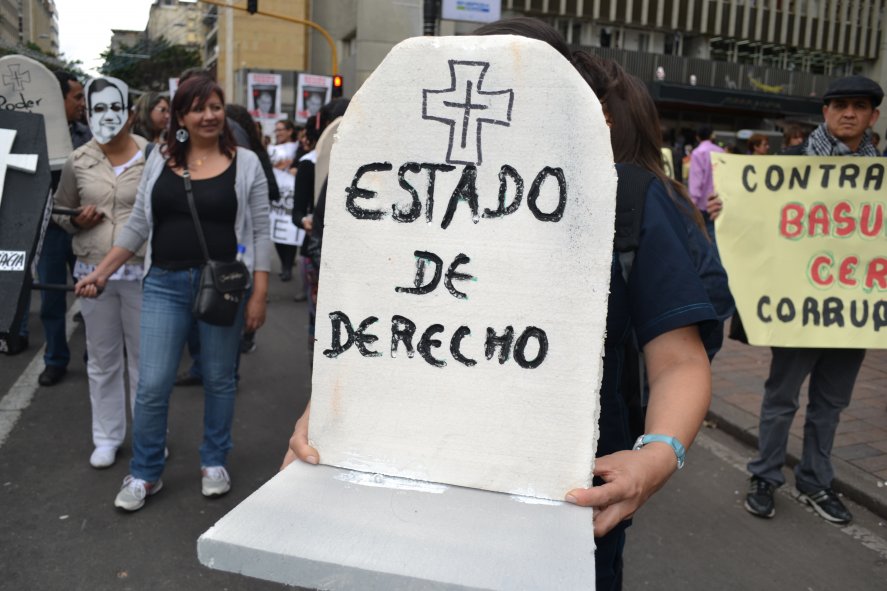The statement of the Council of State on its decision in the Tutela filed by the mayor of Gustavo Petro wants to confuse the Public Opinion and the Inter-American Commission with mechanisms that last months and years. The urgent precautionary measure contemplated by the Colombian administrative contentious justice is in full laboratory, it has not worked in similar cases and by the time the measure is requested, the fundamental rights of Gustavo Petro and his constituents could have been violated by the materialization of an irreparable damage that leads to a consummated damage.
The Inter-American Commission on Human Rights, IACHR, has been fulfilling its mandate of “promoting the observance and defense of human rights” through the system of precautionary measures for 30 years, which allows it to protect the life, integrity and other fundamental rights at risk, such as the political rights of thousands of people in the Americas.
Article 25 of the Rules of Procedure of the IACHR empowers it to issue precautionary measures, whenever there are serious and urgent situations that present a risk of irreparable harm to persons or groups of persons, or to the subject matter of a petition or case pending before the organs of the inter-American system.
Political rights “cannot be suspended”, in the terms of Article 27 of the American Charter of Human Rights, ACHR, which is indicative of the force they have in the inter-American system, political rights can only be limited, among others, by reason of “a conviction, by a competent judge, in criminal proceedings”, never by an administrative authority such as the Attorney General of the Nation in the case of Colombia. This restriction has been reaffirmed by the recent jurisprudence of the IACHR in the case of López Mendoza v. Venezuela.
Precautionary measures are binding on member states, which emanates from the general obligation to guarantee human rights, HR, under the Inter-American treaties on HR, Articles 106 of the OAS Charter, 41 (b) of the ACHR, 18 (b) of the Statute of the IACHR, among others.
In Colombia, the Constitutional Court, in repeated rulings, has established that the precautionary measures decided by the IACHR are mandatory, among others, Ruling T-524/05 of the Constitutional Court. See attached file
On the Control of Conventionality, the Inter-American Court of Human Rights has pronounced in various judgments, establishing the responsibility of the State, specifically of judges, national courts and bodies responsible for the administration of justice, to submit to and ensure compliance with the international treaty that has been ratified, in this case the American Convention. In this sense, these bodies should act immediately and ex officio to adapt their decisions to these provisions and standards.
The Block of Constitutionality, recognized by the National Constitution in Article 93, recalls that, “International treaties and conventions ratified by Congress, which recognize human rights and prohibit their limitation in states of emergency, prevail in the internal order. The rights and duties enshrined in this Charter, shall be interpreted in accordance with international treaties on human rights ratified by Colombia.”
The statement of the Council of State on its decision in the Tutela filed by the mayor of Gustavo Petro wants to confuse the Public Opinion and the Inter-American Commission with mechanisms that last months and years.
The action for annulment and reestablishment of rights is not a suitable mechanism to guarantee the fundamental rights of Gustavo Petro and his constituents in a simple, fast and effective manner, since it takes at least 3 years. At this moment it is not possible to file a lawsuit for nullity and reestablishment of rights, since a conciliation requirement must be previously exhausted before the Attorney General’s Office of the Nation.
The urgent precautionary measure contemplated by the Colombian administrative contentious justice is in full laboratory, it has not worked in similar cases and by the time the measure is requested, the fundamental rights of Gustavo Petro and his constituents could have been violated by the materialization of an irreparable damage leading to a consummated damage.
In spite of the above, President Santos will consult the Council of State to see if the precautionary measures of the IACHR are binding or not. Another weakening of the Inter-American system? Is the train wreck between high courts being repeated?
Rafael Barrios Mendivil
Founding Member
Lawyers Collective “José Alvear Restrepo”.
Press articles on President Santos’ position:
http://www.eltiempo.com/politica/entrevista-con-juan-manuel-santos-_13652716-4
http://www.eltiempo.com/politica/ARTICULO-WEB-NEW_NOTA_INTERIOR-13615921.html
sentencias_corte_constitucional_medidas_cautelares_cidh

